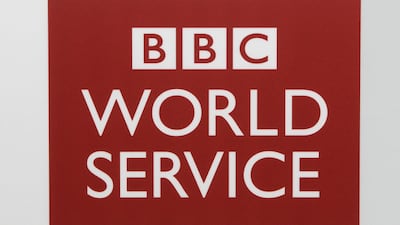BBC Arabic and BBC Persian radio services are among the 10 radio stations BBC World Service plans to scrap, the broadcaster said on Thursday.
Nearly 400 jobs will be cut as part of a plan to shift from linear, broadcast content to digital — and in the process, trim £28.5 million from the service's £340m annual budget.
The reduction means almost half of all 41 BBC World Service language services will now be digital only.
The economising is one tranche of a wider plan in which the BBC plans to reduce its overall budget by £500m, an ambition blamed by unions on the UK government.
In July, the broadcaster detailed plans to merge BBC World News television and its domestic UK equivalent into a single channel to launch in April next year.
BBC World Service — one of the UK's most recognisable global brands — currently operates in 41 languages around the world, with a weekly audience of about 364 million people. No language services will close under the latest proposal, the broadcaster insisted, although some production will move out of London and schedules will change.
But the corporation said audience habits were changing and more people were accessing news online which, along with a freeze on BBC funding and increased operating costs, meant a move to “digital first” made financial sense.
“Today's proposals entail a net total of around 382 post closures,” the public service broadcaster said in an online statement.
Eleven language services — Azerbaijani, Brasil, Marathi, Mundo (Spanish), Punjabi, Russian, Serbian, Sinhala, Thai, Turkish and Vietnamese — are already digital only.
Under the restructuring plans, they will be joined by seven more: Chinese, Gujarati, Igbo, Indonesian, Pidgin, Urdu and Yoruba.
Radio services in Arabic, Persian, Kyrgyz, Hindi, Bengali, Chinese, Indonesian, Tamil and Urdu will stop, if the proposals are approved by staff and unions.
The Thai service will move to Bangkok, the Korean service to Seoul and the Bangla service to Dhaka.
The Focus on Africa television bulletin will be broadcast from Nairobi, it added.
Digital audiences double
BBC World Service director Liliane Landor said there was a “compelling case” for expanding digital services, as audiences had more than doubled since 2018.
“The way audiences are accessing news and content is changing and the challenge of reaching and engaging people around the world with quality, trusted journalism is growing,” she said
The head of the broadcasting union Bectu, Philippa Childs, said they were disappointed over the proposed changes.
“While we recognise the BBC must adapt to meet the challenges of a changing media landscape, once again it is workers who are hit by the government's poorly judged political decisions,” she said.
The government's freezing of the licence fee that pays for BBC World Service had created the funding squeeze and the need for cuts, she added.
Bectu will push for staff to be redeployed where possible and to ensure it “mitigates the needs for any compulsory redundancies”, Ms Childs said.
BBC World Service is funded out of the UK licence fee — currently £159 for colour TV and payable by every household with a television set.
The BBC has faced repeated claims from right-wingers since the UK's divisive Brexit referendum in 2016 of political bias, and pushing a “woke”, London-centric liberal agenda.
But it has faced similar accusations of political bias in favour of the right from the left, with many believing it presents a very orthodox and outmoded view of the economy.

